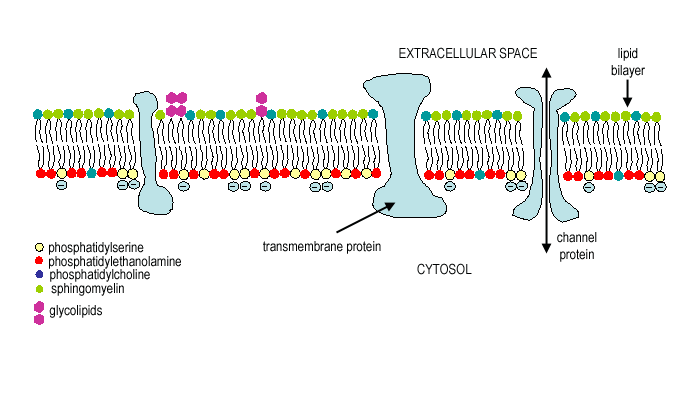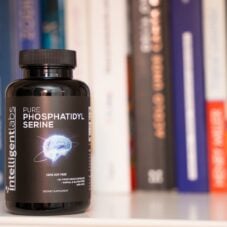Nootropics
Cognitive Decline – Can Phosphatidylserine Help?
The older we get, the more unhealthy our neurons become. At some point, most people start to notice some minor symptoms, such as their short term memory not being as sharp as it once was, or struggling to remember names and faces that were once familiar. This is a natural part of aging and is known as cognitive decline.
A happy, healthy brain that works well has brain cells that can efficiently connect or ‘talk’ with each other. The way brain cells connect is called a “synapse”, and all the cells in our brain and central nervous systems use synapses to allow us to think, move, learn and remember. However, as we age our brain cells (aka neurons) start to die-off, and the neurons that survive get less healthy and slowly lose their ability to connect to the other neurons surrounding them.
Cognitive decline is obviously not great and it might not hugely affect our lives. However, if we allow the degeneration to continue, we would most likely reach the next stage beyond this known as cognitive impairment. It’s a little more serious and means people are living well below their potential, but they can still live relatively normally and independently.
Yet, when things progress beyond a certain point, we reach the stage of dementia where completing simple everyday tasks starts becoming a problem. And we would no longer be able to live an unaided life. 60%-80% of cases of dementia are Alzheimer’s.

Table of Contents
Cell Membranes and Cognitive Decline
Dementia is a term for a group of diseases and conditions that lead to a decline in cognitive functions—memory, behavior, language, problem-solving and decision-making—to the point that interferes with everyday life.
Over many years, researchers revealed several different causes of dementia, of most significance, was a change in the structure of the membranes that surround and protect our brain cells as a result of an abnormal buildup of deformed proteins, leading to progressive cognitive decline until reaching dementia.
What Are Cell Membranes?
Our cell membranes are made up of 2 layers of lipids, known as the lipid bilayer, and as our cells age, they shrink and the composition of the lipid bilayer changes.
Normally, cells should be plump, fluid, malleable and flexible, which allows them to efficiently receive the synapse signal from other cells, as well as being permeable, allowing all of the proteins, enzymes, nutrients, oxygen, and glucose, etc., to move in and out of the cell.
However, as the membranes lose their plumpness and fluidity they become harder, thus less permeable and less able to adjust to receiving synaptic signals. You can think of it as an orange that starts off plump and juicy, but as it loses moisture it becomes dryer and harder.
What Are Lipid Bilayers?

The lipid bilayers are made up of Phosphatidylcholine, Phosphatidylethanolamine, Sphingomyelin (a combination of Phosphatidylcholine and Phosphatidylethanolamine), Phosphatidylserine and the omega-3 fatty acid DHA.
Like Phosphatidylcholine, Phosphatidylethanolamine is very important to the structural integrity of the membrane; a little like the steel frame of a building, whereas the phosphatidylserine and the DHA allow extra fluidity and flexibility.
How Aging Affects the Lipid Bilayers?
As we age the phosphatidylserine content of the membranes decreases and the cholesterol content increases (1,3). This change is the key to increasing the hardness and reducing the fluidity and flexibility of the cell membrane.
This causes a reduction in enzymatic activity and the proteins and other nutrients are no longer able to get in and out of the cell easily. Therefore, the cells simply can’t efficiently communicate with other cells (1,4,5).
Thankfully, we can prevent this decline in phosphatidylserine levels by taking a simple phosphatidylserine supplement. Phosphatidylserine supplements are easily absorbed (as long as you take them with food containing fat!), and also easily cross the blood-brain barrier into the brain so they can be absorbed into our neuronal membranes (6).
How Does Phosphatidylserine Help With Cognitive Decline?
Once in the neuronal membranes phosphatidylserine can slow, halt, or even reverse the structural, and biochemical changes that have occurred, and restore flexibility and fluidity to brain cell membranes.
This supports cognitive functions, allowing us to:
- form new short term memories,
- consolidate long term ones,
- as well as retrieve memories
- and create completely new ones.
It also improves our ability to:
- learn
- focus
- concentrate
- and our ability to figure out and solve problems.
We can improve our language skills and our ability to communicate, as well as locomotor functions, especially our rapid reactions and reflexes (6).
Phosphatidylserine supplementation also supports the release of “Nerve Growth Factor”, a hormone that stimulates the growth of new healthy nerve cells and the cleaning up of old and damaged ones (7). Phosphatidylserine also protects membranes from free radicals and oxidative damage and stimulates an increase in our own antioxidant defense systems (8).

Researches on Phosphatidylserine, Cognitive Decline and Cognitive Impairment
Study #1 – open-label trials
In open-label trials (i.e. ones where both the subjects and researchers know that the subjects are receiving phosphatidylserine), older individuals with mild cognitive decline were supplemented with 300mg of Phosphatidylserine (100mg, 3 times a day) for 60 days.
At the end of the 60 day period, the subjects significantly improved their performance on tests of verbal learning, verbal recall, verbal fluency, visual learning, attention, communication skills, initiative, socialization and self-sufficiency (9,10).
Study #2 – 90-day study
Another study extended the supplementation period to 90 days and found very similar results, but also found the subjects improved their ability to recall names and recognize faces (11).
Another group of older adults with more severe cognitive decline achieved significant improvements in verbal learning, verbal recall, attention span and ability to concentrate, vigilance, initiative, socialization, and self-sufficiency following supplementation with the same dose of 100mg of phosphatidylserine 3 times a day.
Study #3 – a double-blind study
A double-blind study (i.e. neither the subjects nor researchers know whether the subjects are receiving phosphatidylserine or placebo) was conducted on both women and men aged over 60 with mild memory loss and 300mg of phosphatidylserine a day for 90 days.
Researchers found the group that supplemented with phosphatidylserine had significant improvements in short term recall, immediate memory, vocabulary skills, word recall, attention span, and vigilance. The placebo group, on the other hand, received no benefit (14).
Study #4 – a double-blind study that targets severe cognitive decline
Another 2 double-blind studies targeted people with more severe cognitive impairment (14), and mild degenerative dementia (15). Researchers found they had significantly improved verbal recall and overall cognitive functioning. They also found significantly reduced withdrawal and apathy compared to the placebo group following phosphatidylserine supplementation.
The considerable success of phosphatidylserine to support brain function and stop cognitive decline in clinical trials was recognized by the FDA who have stated:
- “consumption of phosphatidylserine may reduce the risk of dementia in the elderly” and
- “consumption of phosphatidylserine may reduce the risk of cognitive dysfunction in the elderly” (16).
There’s No Magic Pill
However, it should be noted that phosphatidylserine is not a magic pill. It is best suited for people looking to prevent cognitive decline or with mild to moderate stages of cognitive impairment.
For example, another trial focused on patients with Alzheimer’s who supplemented with 400mg per day of phosphatidylserine. Researchers found that although supplementation – along with a 16-week cognitive training program – produced much greater improvements in neuropsychological tests than just the cognitive training program alone, phosphatidylserine wasn’t able to stop the progress of the disease. They also found that 4 months later, despite continued supplementation with phosphatidylserine, performance had worsened (17).
For anyone looking to prevent cognitive decline or help cease its progress, we recommend trying Phosphatidylserine at 100mg 3 times a day.
💬 Something on your mind? Share your thoughts in the comments. We love hearing from curious minds.
📩 And while you’re here, join our newsletter for more smart stuff (and secret perks)!
References:
(1) Glade, Michael & Smith, Kyl. (2015). Phosphatidylserine and the human brain. Nutrition (Burbank, Los Angeles County, Calif.). 31. 781-786. 10.1016/j.nut.2014.10.014.
(2) Crook TH, Tinklenberg J, Yesavage J, Petrie W, Nunzi MG, Massari DC. Effects of phosphatidylserine in age-associated memory impairment. Neurology 1991;41:644–9.
(3) Crook T, Petrie W, Wells C, Massari DC. Effects of phosphatidylserine in Alzheimer’s disease. Psychopharmacol Bull 1992;28:61–6.
(4) Kim, Hee-Yong & Huang, Bill & Spector, Arthur. (2014). Phosphatidylserine in the Brain: Metabolism and Function. Progress in lipid research. 56. 10.1016/j.plipres.2014.06.002.
(5) Marra C, Silveri MC, Gainotti G. Predictors of cognitive decline in the early stage of probable Alzheimer’s disease. Dement Geriatr Cogn Disord 2000;11:212–8.
(6) Michael J. Glade Ph.D., Kyl Smith D.C., Phosphatidylserine and the human brain, Nutrition 31 (2015) 781–786
(7) De Simone R., Ajmone-Cat M.A., Tirassa P., Minghetti L. Apoptotic PC12 cells exposing phosphatidylserine promote the production of anti-inflammatory and neuroprotective molecules by microglial cells. Journal of Neuropathology and Experimental Neurology. 2003 Feb;62(2):208-16.
(8) Chaung HC, Chang CD, Chen PH, Chang CJ, Liu SH, Chen CC. Docosahexaenoic acid and phosphatidylserine improves the antioxidant activities in vitro and in vivo and cognitive functions of the developing brain. Food Chem 2013;138:342–7
(9) Sinforiani E, Agostinis C, Merlo P, Gualtieri S, Mauri M, Mancuso A. Cognitive decline in ageing brain. Therapeutic approach with phosphatidylserine. Clin Trials J 1987;24:115–25.
(10) Caffara P, Santamaria V. The effects of phosphatidylserine in patients with mild cognitive decline. An open trial. Clin Trials J 1987;24:109–14.
(11) Schreiber S, Kampf-Sherf O, Gorfine M, Kelly D, Oppenheim Y, Lerer B. An open trial of plant-source derived phosphatidylserine for treatment of age-related cognitive decline. Isr J Psychiatry Relat Sci 2000;37:302–7.
(12) Granata Q, DiMichele J. Phosphatidylserine in elderly patients. An open trial. Clin Trials J 1987;24:99–103.
(13) Allegro L, Favaretto V, Ziliotto G. Oral phosphatidylserine in elderly patients with cognitive deterioration. An open study. Clin Trials J 1987;24:104–8.
(14) Cenacchi T, Bertoldin T, Farina C, Fiori MG, Crepaldi G. Cognitive decline in the elderly: a double blind, placebo-controlled multicenter study on efficacy of phosphatidylserine administration. Aging Clin Exp Res 1993;5:123–33.
(15) Villardita C, Grioli S, Salmeri G, Nicoletti F, Pennisi G. Multicentre clinical trial of brain phosphatidylserine in elderly patients with intellectual deterioration. Clin Trials J 1987;24:84–93.
(16) Taylor CL. Letter regarding phosphatidylserine and cognitive dysfunction and dementia. Bethesda, MD: US Food and Drug Administration; 2003.
(17) Heiss WD, Kessler J, Mielke R, Szelies B, Herholz K. Long-term effects of phosphatidylserine, pyritinol, and cognitive training in Alzheimer’s disease. Dementia 1994;5:88–98






